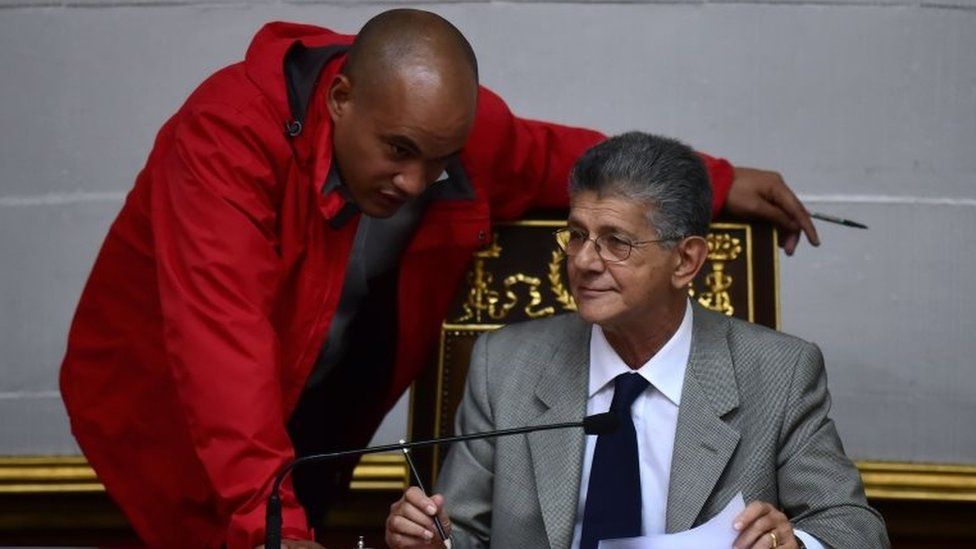Venezuela rivals' 'truce' crumbles amid name calling
- Published

Tension has again risen between Venezuela leader Nicolas Maduro and the opposition just hours after they had taken steps to defuse the situation.
An opposition spokesman said President Maduro had "broken the truce" when he had labelled opposition politician Freddy Guevara a "terrorist".
Mr Guevara had incurred the anger of Mr Maduro by saying that he did not agree with an opposition coalition decision to call off a protest march.
The march was planned for 3 November.
Rollercoaster ride
Events in Venezuela have been moving fast since an unexpected meeting between Pope Francis and President Maduro on 24 October.
The Vatican announced it would mediate in talks aimed at defusing Venezuela's political and economic crisis.
The country is deeply divided into followers of Mr Maduro and those who blame the president for the dire state of Venezuela's economy.
Venezuela is suffering from spiralling inflation and severe shortages of basic goods which have led to some Venezuelans saying they are going hungry.
The opposition wants to remove Mr Maduro from office, which has led the president to accuse them of coup-mongering.
The two sides met face to face for the first time this year on Sunday for talks mediated by a Vatican envoy and former international leaders from Spain, the Dominican Republic and Panama.
They agreed to create four working groups and to reconvene on 11 November.
What signs of goodwill have there been?
Since Sunday's meeting, both sides have taken conciliatory measures.
- The government and the opposition agreed to "cool down the rhetoric"
- The government released five detained opposition politicians
- The opposition delayed a planned symbolic trial of President Maduro in the National Assembly
- The opposition called off a protest march to the presidential palace planned for 3 November
What has the atmosphere been like?
Following Sunday's meeting, both sides did indeed tone down their rhetoric.
On Tuesday, President Maduro praised the opposition's decision to call off the protest march.
He also called National Assembly leader Henry Ramos Allup "sensible", which contrasts with the insults he has in the past directed at him.
The president also looked relaxed during the recording of his new radio programme, Salsa Hour, during which he could be seen dancing with his wife, Cilia Flores.
However, his choice for the first song seemed a thinly-veiled message to those who want to see him gone from power: Ray Barretto's "Indestructible".
What went wrong?
Divisions within the opposition surfaced shortly after the National Assembly meeting.
Popular Will, the party of jailed opposition leader Leopoldo Lopez, said it did not agree with the opposition coalition's decision to postpone Mr Maduro's trial and to call off Thursday's protest march.
The party did not attend the Vatican-mediated talks on Sunday and is considered one of the more hard-line in the Democratic Unity coalition (MUD).
Its interim leader, Freddy Guevara, said Popular Will would not join any dialogue until Mr Lopez had been released.
How did Mr Maduro respond?
President Maduro called Mr Guevara "a coward" and warned that his immunity as a member of the National Assembly would not protect him from going to jail.
He said that Popular Will was a party of "terrorists" and called on the courts "to take action" against it and Mr Guevara.
He did not say what possible charges Mr Guevara could be facing or what alleged "crimes" they had committed.
What did the opposition say?
Mr Guevara said the party would not bow before President Maduro and his threats.
He was backed up by the spokesman for the MUD coalition, Jesus Torrealba, who tweeted that "by attacking Freddy Guevara and Popular Will, Maduro is attacking the negotiating table and mocks the word of @Pontifex-es", referring to the Pope's Twitter handle.
Mr Torrealba also said that Mr Maduro had "broken the truce" and accused Mr Maduro of "dynamiting the negotiating table".
What now?
It is currently not clear whether the protest march planned for 3 November may now be back on.
While the Popular Will party could hold its own protest march, it would draw smaller numbers than one organised by the opposition as a whole.
With the rival sides trading barbs again, the Vatican envoy and other mediators will have their hands full trying to ensure that the next round of talks goes ahead as planned on 11 November.
Meanwhile, international pressure is mounting for the two sides to find a solution to ease the economic crisis which is leaving Venezuelans increasingly desperate.
- Published1 November 2016
- Published25 October 2016
- Published23 October 2016